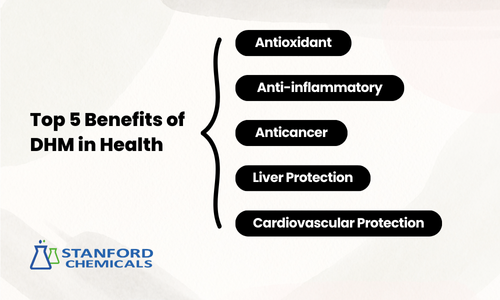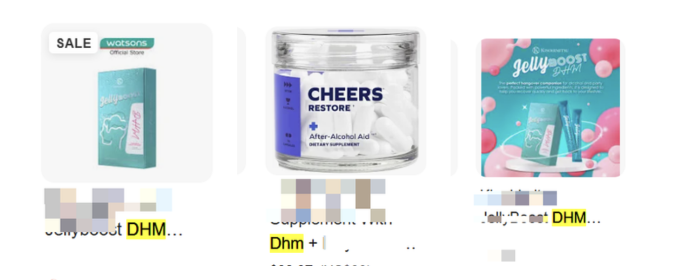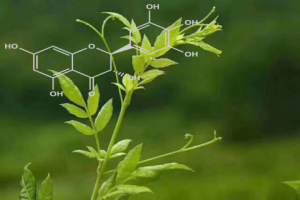Applications of Dihydromyricetin in Functional Foods
Dihydromyricetin (DHM) possesses antioxidant, anti-inflammatory, and liver-protective properties. As a result, it finds wide applications in functional foods, including hangover-relief beverages, liver-health drinks, dairy products, and even animal feed.
Natural plant-derived bioactive compounds have been of specific interest to the functional food market for a long time. Dihydromyricetin (DHM) is a flavonoid extracted from Ampelopsis grossedentata (vine tea). It exhibits outstanding physiological activities such as antioxidant, anti-inflammatory, hepatoprotective, and hypoglycemic activities. Its potential in functional food applications is extensive.
Dihydromyricetin benefits
Functional Beverages
Dihydromyricetin first gained public attention due to its hangover relief and liver protection activity. Studies indicate that DHM allows for ethanol metabolism, enhances the alcohol tolerance of the liver, and diminishes alcohol-induced nervous system suppression. Various animal studies and initial human trials have proven that DHM effectively cures post-alcohol discomfort like dizziness and nausea. Due to these benefits, it has been utilized heavily within the hangover relief supplement market. Beverage companies are also incorporating DHM into functional beverages such as low-sugar beverages promoted for liver protection or sobering effects, which are gaining popularity with younger consumers.
Beverages on the market with DHM as an added ingredient
Aside from alcohol detoxification, DHM’s antioxidant activity more than ten times that of vitamin C, allows it to neutralize free radicals and postpone fatigue. For this reason, some companies incorporate DHM into their products to increase energy-boosting and anti-fatigue effects.
Dairy Products
Dihydromyricetin is gradually finding its way into the dairy industry. Dairy products, with their nutritional advantage, are ideal carriers of functional molecules. Blending DHM with yogurt, apart from increasing the antioxidant activity of the yogurt, imparts hepatoprotective activity as well. In one study, researchers fortified fermented milk with DHM and saw that it was stable under refrigerated storage, showed no loss of flavor quality, and even increased probiotic activity. Such DHM-enriched functional yogurt can be a novel health-oriented dairy food suitable for the elderly or frequent alcohol consumers.
Animal Feed
As a green additive, Dihydromyricetin is becoming a promising option for animal feed. DHM increases the immunity of animals, speeds up growth, and improves feed conversion rate. In a trial with chickens, researchers added DHM to their basal diet. Results showed that supplementation of 0.05% DHM greatly improved feed consumption and body weight along with the initial-stage feed-to-meat ratio. Anti-inflammatory effects and antioxidant properties of DHM also enhance animal liver function and the immune system to reduce the occurrence of toxin-induced feed-induced liver damage.
Food Preservation
Antioxidant activity of dihydromyricetin has applications in food preservation. Lipid peroxidation is one of the major causes of food spoilage, particularly in cooked meat, baked foods, and fried foods, where it affects taste and safety. Research indicates DHM inhibits lipid oxidation significantly and possesses antimicrobial activity. Some meat companies already use low levels of DHM in sausages, ham, and the like to reduce preservatives and add shelf life. This process of natural preservation is more consistent with consumer needs.
Opportunities and Challenges
With the growing popularity of the clean label concept, consumers increasingly favor products with natural, safe ingredients. As a plant-extracted ingredient, dihydromyricetin labeling has built-in glamour, fitting the era. In fruit-vegetable beverages or sugar-free foods, DHM is commonly used to enhance antioxidant functionality, offering product stability, as well as enhancing brands’ natural and healthy image.
Dihydromyricetin is limited by some technical difficulties in practical applications. For example, its low water solubility and bitter taste need to be managed with careful formulation. Fortunately, researchers have explored a variety of solutions to improve its solubility.
Solutions to Improve Solubility and Bioavailability of Dihydromyricetin
| Method | Effectiveness | Suitability for Food Industry |
| Microencapsulation | Excellent | Recommended |
| Nanocarriers | Very Good | High cost, suited for premium products |
| Co-crystallization | Good | Mature technology |
| pH adjustment | Effective but requires caution | Limited applications |
| Co-solvents | Simple but affects flavor | Requires recipe adjustments |
| Enzymatic modification | High potential | Under development |
Conclusion
From beverages and dairy to animal feed and food preservation, Dihydromyricetin offers a natural, safe profile with diverse health benefits. As extraction technology advances and regulatory bodies tighten standards, DHM will have a greater place in the functional food industry.
Stanford Chemical Company (SCC) is a premium supplier of hyaluronic acid and herbal extracts. We offer Dihydromyricetin and Food-grade Pure HA Powder. For more information on these products or specific applications, please contact us and check out our home pages.



